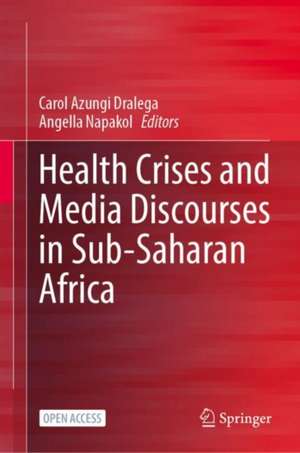Health Crises and Media Discourses in Sub-Saharan Africa
Editat de Carol Azungi Dralega, Angella Napakolen Limba Engleză Paperback – 25 mai 2022
This is a timely resource for academics, advocacy groups, media practitioners and policy makers working on crises and media reporting, not just in Africa but anywhere in the global South.
| Toate formatele și edițiile | Preț | Express |
|---|---|---|
| Paperback (1) | 355.31 lei 6-8 săpt. | |
| Springer International Publishing – 25 mai 2022 | 355.31 lei 6-8 săpt. | |
| Hardback (1) | 429.22 lei 6-8 săpt. | |
| Springer International Publishing – 25 mai 2022 | 429.22 lei 6-8 săpt. |
Preț: 355.31 lei
Nou
Puncte Express: 533
Preț estimativ în valută:
67.99€ • 70.85$ • 56.29£
67.99€ • 70.85$ • 56.29£
Carte tipărită la comandă
Livrare economică 03-17 aprilie
Preluare comenzi: 021 569.72.76
Specificații
ISBN-13: 9783030951023
ISBN-10: 3030951022
Pagini: 283
Ilustrații: XVIII, 283 p. 12 illus., 10 illus. in color.
Dimensiuni: 155 x 235 mm
Greutate: 0.43 kg
Ediția:1st ed. 2022
Editura: Springer International Publishing
Colecția Springer
Locul publicării:Cham, Switzerland
ISBN-10: 3030951022
Pagini: 283
Ilustrații: XVIII, 283 p. 12 illus., 10 illus. in color.
Dimensiuni: 155 x 235 mm
Greutate: 0.43 kg
Ediția:1st ed. 2022
Editura: Springer International Publishing
Colecția Springer
Locul publicării:Cham, Switzerland
Cuprins
- Part I Digital and Political Economy of the Media. - The Sustainability and Economic Impact of the COVID-19 Pandemic on Media Houses in Uganda and Ethiopia. - Political Economy of COVID-19 and the Implication on Media Management and Sustainability in Nigeria. - The Impact of COVID-19 on the Digitalization of the Namibian Media. - Media Viability, Covid-19 and the ‘Darwinian’ Experience in Southern Africa: Glimpses from Botswana, Eswatini, Lesotho, Malawi, Namibia, South Africa, Zambia and Zimbabwe. - Part II Journalism Practice, Audiences and News Discourses. - Critical Journalism and Media Convergence During the COVID-19 Pandemic: Representation of Corruption in Zimbabwean Online News. - Constructive Journalism and COVID-19 Safe Nation Narratives in The Herald Newspaper: Implications for Journalism Ethics in Zimbabwe. - Endangered Voices: Nigerian Journalists’ Safety amid the COVID-19 Pandemic. - Framing Poverty in Nigerian Online Media Reportson the Inaugural Neglected Tropical Diseases Day. - Face-to Face with COVID-19: Experiences of Ghanaian Frontline Journalists Infected with the Virus. - A Comparative Discourse Analysis of African Newspaper Reports on Global Epidemics: A Case Study of Ebola and Coronavirus. - Citizen Journalism and Health Communication in Pandemics’ Prevention and Control. - ‘This Is a Punishment to America’ Framing the COVID-19 Pandemic in Zimbabwe’s Mainstream Media. - Part III Regulation, Representation and Marginalisation. - Cybercrimes Law and Citizen Journalism Clampdown During the Covid-19 Pandemic in Tanzania. - Framing the AIDS Discourse: A Critic of Journalistic Source Norms in Uganda’s HIV and AIDS Print News. - ‘Weapons of Oppressors’: COVID-19 Regulatory Framework and its Impact on Journalism Practices in Southern Africa. - Media Discourses on Gender in the Time of COVID-19 Pandemic in Zimbabwe.
Notă biografică
Carol Azungi Dralega (PhD) is an Associate Professor and Head of Research at the Department of Journalism, Media and Communication, NLA University College in Norway. She teaches in the MA program in Global Journalism. Carol, who is originally from Uganda and a former journalist/editor with Uganda’s two leading media houses, holds an MPhil/PhD from the Media Studies Institute, University of Oslo. She is a researcher at the Nordic Center of Excellence (Uppsala University) as well as a member of the International Association for Media and Communication Research. Dralega is a founding member of the Global Journalism Community which launched in March 2021. Her research interests include; ICT/media and issues around journalism practice, policy, marginalization and social change.
Angella Napakol (PhD) is a Senior Lecturer and Head the School of Communication, Uganda Christian University. She holds a PhD from the University of Kwazulu-Natal, South Africa, an MS in Mass Communication from North Dakota State University, USA, and a BA in Social Sciences from Makerere University, Uganda. She teaches in both undergraduate and graduate communication and journalism programs at the Faculty of Journalism, Media and Communication. Her key research interests include: health communication; humanitarian, risk and crisis communication; social change communication and intercultural communication.
Textul de pe ultima copertă
This is an open access book which brings together leading scholars and critical discourses on political, economic, legal, technological, socio-cultural and systemic changes and continuities intersecting media and health crises in Sub-Saharan Africa. The volume extensively discusses COVID-19 but it also covers other epidemics, such as malaria, HIV/AIDS as well as “silent” health crises such as mental health---simmering across the subcontinent. The chapters fill knowledge gaps, highlight innovations, unpack the complexities surrounding the media ecosystem in times of health crises. They explore, among other issues, the politics of public health communication; infodemics; existential threats to media viability; draconian legislations; threats to journalists/journalism; COVID-related entrepreneurship, marginalization, and more.
This is a timely resource for academics, advocacy groups, media practitioners and policy makers working on crises and media reporting, not just in Africa but anywhere in the global South.
This is a timely resource for academics, advocacy groups, media practitioners and policy makers working on crises and media reporting, not just in Africa but anywhere in the global South.
Caracteristici
This book is open access, which means that you have free and unlimited access Discusses innovative ways in which media in fragile regimes are responding to health crises Brings up gender, social justice, human rights violation, press regulation, corruption, and mental health concerns Highlights concerns like misinformation, fake news, journalists’ safety, financial sustainability & viability issues
